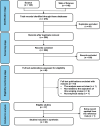Dementia among Minority Populations: A Scoping Review of Meaning, Language, and Translation
- PMID: 38776886
- PMCID: PMC11309075
- DOI: 10.1159/000539446
Dementia among Minority Populations: A Scoping Review of Meaning, Language, and Translation
Abstract
Background: Dementia as a neurocognitive disorder is becoming increasingly common worldwide, and minority groups are more vulnerable than the general population. Many factors may contribute to their vulnerability such as misconceptions, language barriers, cultural factors, invalid assessment tools, lack of knowledge, or assigning spiritual beliefs to dementia symptoms. Therefore, this scoping literature review aimed to clarify how empirical studies reflect the meaning of dementia, language, and translation among minority ethnic groups.
Summary: The PRISMA extension for the scoping review protocol was used. Thirty-eight studies published in English were reviewed and analysed. The findings revealed that lack of knowledge about dementia and attributing the disease to the normal ageing process were frequent among minority groups. Furthermore, their cultural-specific perspectives and worldviews of wellness and well-being can impact the way dementia is perceived, consequent help-seeking behaviours, or caregiving. Facilitating educational programs to enhance the knowledge and experiences of ethnic communities might be beneficial. Moreover, language is shown to be an important aspect in dementia assessment and participants' educational level could significantly impact their functional capacity when responding to cognitive measures. Even though there are some useful screening tests, diagnosis barriers might be eased by assessment tool development, modifications, and accurate translations for ethnic communities.
Key messages: A promising pathway to support ethnically diverse communities regarding dementia can be raising awareness, providing ethnic-specific services, developing cultural-specific tools to assess dementia or any cognitive impairment by considering perceptions, language, and culture among ethnic groups. Cultural and spiritual considerations could also encourage engagement during assessment.
Keywords: Cognitive impairment; Dementia; Ethnic groups; Minority people; Scoping review.
© 2024 The Author(s). Published by S. Karger AG, Basel.
Conflict of interest statement
The authors have no conflicts of interest to declare.
Figures
Similar articles
-
Perceptions of dementia and use of services in minority ethnic communities: a scoping exercise.Health Soc Care Community. 2017 Mar;25(2):734-742. doi: 10.1111/hsc.12363. Epub 2016 Jun 9. Health Soc Care Community. 2017. PMID: 27278859
-
Attitudes and Preferences Towards Screening for Dementia with a Focus on Ethnic Minority and Low Socio-Economic Groups: A Systematic Review of Research Studies Written in the English Language.J Alzheimers Dis. 2024;100(4):1315-1331. doi: 10.3233/JAD-240315. J Alzheimers Dis. 2024. PMID: 39031361 Free PMC article.
-
Barriers and Facilitators to Healthy Lifestyle Changes in Minority Ethnic Populations in the UK: a Narrative Review.J Racial Ethn Health Disparities. 2017 Dec;4(6):1107-1119. doi: 10.1007/s40615-016-0316-y. Epub 2016 Dec 7. J Racial Ethn Health Disparities. 2017. PMID: 27928772 Free PMC article. Review.
-
"It is always me against the Norwegian system." barriers and facilitators in accessing and using dementia care by minority ethnic groups in Norway: a qualitative study.BMC Health Serv Res. 2020 Oct 15;20(1):954. doi: 10.1186/s12913-020-05801-6. BMC Health Serv Res. 2020. PMID: 33059685 Free PMC article.
-
Minority ethnic groups in dementia care: a review of service needs, service provision and models of good practice.Aging Ment Health. 2002 May;6(2):101-8. doi: 10.1080/13607860220126835. Aging Ment Health. 2002. PMID: 12028878 Review.
References
-
- Perkins C. Dementia: what you need to know: a guide for people with dementia, and their caregivers. Penguin Random House New Zealand Limited; 2013.
-
- World Health Organization [Internet] . Dementia. [cited 2023 March]. Available from: https://www.who.int/news-room/fact-sheets/detail/dementia
-
- World Health Organization [Internet] . Global action plan on the public health response to dementia 2017–2025. [cited 2017 Dec 7]. Available from: https://www.who.int/publications/i/item/global-action-plan-on-the-public...
-
- Sandilyan MB, Dening T. What is dementia? In: Dening KH, editor. Evidence-based practice in dementia for nurses and nursing students. Jessica Kingsley Publishers; 2019. Vol. 21; p. 12–26.
Publication types
MeSH terms
Associated data
LinkOut - more resources
Full Text Sources
Medical


